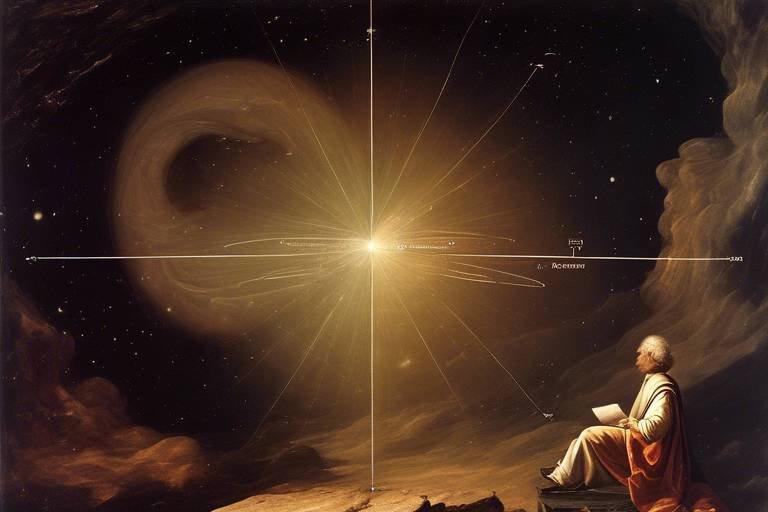Ontology - A Tool for Understanding Reality or an Abstract Concept?
Ontology, at first glance, might seem like one of those fancy philosophical terms that only scholars toss around in dimly lit rooms filled with dusty books. But let’s peel back the layers and see what it really means. Imagine you’re trying to understand a new city. You want to know not just the streets and buildings, but the very essence of what makes that city unique. This is much like what ontology seeks to do—it’s about digging deep into the nature of existence itself. Are we just a collection of atoms, or is there something more profound at play? This article will take you on a journey through the intricate landscape of ontology, exploring its significance in both philosophy and science, and whether it serves as a practical tool for understanding our reality or remains an abstract concept that dances just out of reach.
So, what exactly is ontology? In the simplest terms, ontology is the branch of philosophy that studies the nature of being, existence, and reality. It’s like a philosophical lens through which we can view the world around us. Think of it as a map that helps us navigate the complex terrain of what exists. Ontology seeks to answer fundamental questions such as: What entities exist? How can we categorize them? Are there different kinds of existence? These questions are not just academic; they have real-world implications that affect how we interpret our experiences and understand our place in the universe.
The roots of ontology can be traced back to ancient philosophy, particularly in the works of Aristotle. Understanding this historical context is crucial, as it helps clarify ontology's evolution and relevance in contemporary discussions. Aristotle, often regarded as the father of Western philosophy, introduced concepts that are foundational to ontological inquiry. His work serves as a springboard for centuries of philosophical thought, influencing countless thinkers who followed. It’s fascinating to consider how these ancient ideas continue to resonate in today’s debates about existence and reality.
Aristotle’s contributions laid the groundwork for ontology, introducing essential concepts such as substance and essence. To put it simply, substance is what something fundamentally is, while essence pertains to the properties that make an entity what it is. Imagine a tree: its substance is the tree itself, while its essence includes the characteristics that define it—like its leaves, bark, and height. These concepts are pivotal in ontological discussions, as they help us categorize and understand the myriad entities that populate our reality.
When we delve into the concepts of substance and essence, we begin to see how they shape our understanding of the world. Substance can be thought of as the 'stuff' of reality, the tangible elements that we can touch and see. In contrast, essence is more elusive; it’s about the qualities that give an entity its identity. This distinction is crucial in ontology, as it allows us to differentiate between what something is and what it signifies. For instance, a chair is not just a collection of wood and nails (substance); it also embodies the idea of seating (essence). This interplay between substance and essence is a central theme in ontological discourse.
Aristotle's ontology significantly impacted later philosophers, including Descartes and Kant, who expanded upon or challenged his ideas. Descartes, for example, famously declared, “I think, therefore I am,” which led to new discussions about existence and consciousness. Kant, on the other hand, introduced the notion that our understanding of reality is shaped by our perceptions. This ongoing dialogue illustrates how ontology is not static; it evolves as new thinkers contribute their perspectives, creating a rich tapestry of philosophical inquiry.
Fast forward to contemporary philosophy, and we see a plethora of ontological theories emerging. Each offers unique perspectives on existence and reality, ranging from realism, which posits that entities exist independently of our perceptions, to nominalism, which argues that universals are merely names without any corresponding reality. These theories can sometimes feel like a philosophical buffet—there’s something for everyone, but it can also be overwhelming. However, they all share a common goal: to deepen our understanding of what it means to exist.
But ontology isn’t just for philosophers with tweed jackets and pipe dreams; it plays a crucial role in scientific discourse as well. Fields like biology, physics, and information science rely heavily on ontology to categorize and understand entities essential for research and development. For instance, in biology, understanding the different classifications of living organisms is fundamental to the study of life itself. Without a solid ontological framework, scientists would struggle to communicate their findings and build upon each other's work.
In the realm of information science, ontology refers to a structured framework for organizing information. This framework enables better data sharing and interoperability across systems and domains. Think of it as a universal language that allows different systems to talk to each other. For example, if one database categorizes animals by their habitat while another uses a different classification, ontology helps bridge that gap, ensuring that data can flow seamlessly between systems. This is particularly important in our increasingly interconnected world, where the ability to share and access information efficiently is paramount.
The implications of ontology extend beyond science into ethics, epistemology, and metaphysics. It prompts deeper inquiries into the nature of reality and our understanding of existence. Questions about what it means to be human, the nature of consciousness, and the ethical implications of our existence all stem from ontological considerations. As we grapple with these profound questions, we realize that ontology is not just an abstract concept; it is a vital tool for navigating the complexities of life.
Despite its significance, ontology faces critiques regarding its practicality and relevance. Some argue that it may veer into abstract speculation rather than addressing concrete realities. Critics often differentiate between abstract concepts and concrete realities, questioning whether ontology effectively bridges the gap between philosophical theorizing and tangible experiences. This debate highlights the ongoing tension between philosophical inquiry and practical application, a theme that resonates throughout the history of philosophy.
In this context, it’s essential to consider how ontology can sometimes feel disconnected from everyday life. While philosophers may ponder the nature of existence, individuals are often more concerned with the practicalities of their daily experiences. Can ontology truly provide insights that are applicable to real-world situations? This question is at the heart of many critiques, as it challenges the relevance of ontological discussions in a rapidly changing world.
Alternative approaches, such as pragmatism and existentialism, challenge traditional ontological frameworks. Pragmatism, for instance, emphasizes the practical consequences of ideas, arguing that the truth of a concept lies in its utility. Existentialism, on the other hand, focuses on individual experience and the subjective nature of reality. These perspectives offer different lenses through which to view existence and reality, enriching the philosophical landscape and inviting us to reconsider the role of ontology in our understanding of life.
- What is ontology? Ontology is the branch of philosophy that studies the nature of being, existence, and reality.
- How did Aristotle contribute to ontology? Aristotle introduced fundamental concepts such as substance and essence, which are pivotal in understanding existence.
- Why is ontology important in science? Ontology helps categorize and understand entities, facilitating better communication and research across various scientific fields.
- What are some critiques of ontology? Critics argue that ontology can become abstract and disconnected from practical realities, questioning its relevance in everyday life.
- How do alternative philosophical approaches relate to ontology? Approaches like pragmatism and existentialism challenge traditional ontological frameworks, offering new perspectives on existence.

Defining Ontology
Ontology is a fascinating branch of philosophy that dives deep into the very essence of existence. It's not just a dry academic term; it’s a vibrant field that seeks to unravel the mysteries of what it means to "be." At its core, ontology poses fundamental questions: What entities exist? How can we categorize them? Are there different kinds of existence? These inquiries are not merely theoretical; they resonate with our everyday experiences and perceptions of reality.
To put it simply, ontology is like a map of reality, helping us navigate the complex landscape of existence. Imagine trying to explore a vast, uncharted territory without any guidance. That’s what life can feel like without an understanding of ontology. It provides a framework that helps us make sense of the world around us, enabling us to distinguish between what is real and what is merely a figment of our imagination.
In philosophical terms, ontology can be divided into several key areas:
- Existence: What does it mean for something to exist? This question leads to discussions about different modes of being.
- Categories of Being: How do we classify different entities? Are they substances, properties, or relations?
- Identity and Change: How do we understand the identity of objects over time? What happens when they change?
These areas highlight the richness of ontology and its relevance not just in philosophy but also in various fields such as science, linguistics, and artificial intelligence. For instance, in computer science, ontologies are used to create structured frameworks that allow for better data organization and sharing. This practical application underscores the importance of understanding what entities exist and how they relate to one another.
In conclusion, ontology is more than just an abstract concept; it is a vital tool for understanding reality. By exploring the nature of being and existence, we gain insights that can influence everything from philosophical inquiry to scientific research. As we continue to grapple with these profound questions, ontology remains a cornerstone of our quest for knowledge and understanding.

Historical Background
Ontology, as a formal study of being and existence, has deep roots that stretch back to the ancient philosophers who shaped our understanding of reality. The journey into ontology began with the remarkable works of Aristotle, who is often hailed as the father of this discipline. His inquiries into what it means to exist laid the groundwork for centuries of philosophical exploration. Aristotle's ontology was not merely an abstract venture; it was a practical approach to understanding the world around him, providing a framework that sought to categorize all entities.
To appreciate the significance of ontology today, it's crucial to recognize its evolution through history. The ancient Greeks, particularly Plato and Aristotle, introduced fundamental questions about existence that resonate even in contemporary thought. Plato's theory of forms, for instance, posited that non-material abstract forms represent the most accurate reality, while Aristotle countered this with his emphasis on substance and essence, grounding existence in the physical world.
Fast forward to the medieval period, where ontology took on a new dimension with the works of philosophers like Thomas Aquinas. He integrated Aristotelian thought with Christian theology, arguing that existence itself is a reflection of divine creation. This blend of metaphysics and theology opened up new avenues for understanding reality and existence, leading to a rich tapestry of ontological thought that would influence later thinkers.
As we moved into the modern era, the Enlightenment brought about significant shifts in ontological discussions. Philosophers like René Descartes and Immanuel Kant challenged and expanded upon Aristotelian ideas. Descartes famously declared, "I think, therefore I am," emphasizing the role of consciousness in understanding existence. Kant, on the other hand, introduced the idea that our perception of reality is shaped by the structures of our mind, suggesting a more subjective approach to ontology.
In the 20th century, ontology continued to evolve, with existentialists like Martin Heidegger and Jean-Paul Sartre questioning the very nature of being. They emphasized individual existence and the human experience, positing that existence precedes essence, a radical departure from traditional ontological frameworks. This shift highlighted the importance of personal experience and choice in defining reality.
To summarize the historical trajectory of ontology, we can outline the key periods and their contributions:
| Period | Key Philosophers | Contributions |
|---|---|---|
| Ancient Greece | Plato, Aristotle | Foundation of ontology; substance and essence |
| Medieval | Thomas Aquinas | Integration of ontology with theology |
| Modern | Descartes, Kant | Subjective experience and consciousness in ontology |
| 20th Century | Heidegger, Sartre | Existentialism and the focus on individual experience |
In conclusion, the historical background of ontology reveals a rich and dynamic evolution of thought that continues to influence contemporary discussions. By tracing its roots from ancient philosophy through to modern existentialism, we can appreciate how ontology serves as a vital tool for understanding both reality and our place within it. It is this blend of historical context and philosophical inquiry that makes ontology not just an abstract concept, but a crucial framework for examining the nature of existence itself.
- What is ontology? Ontology is the branch of philosophy that studies the nature of being and existence.
- Who are the key figures in the history of ontology? Key figures include Aristotle, Plato, Thomas Aquinas, Descartes, Kant, Heidegger, and Sartre.
- How does ontology relate to other fields? Ontology intersects with ethics, epistemology, and even science, influencing how we categorize and understand entities in various domains.
- Why is ontology important? It provides a framework for understanding the fundamental nature of reality, existence, and our place in the universe.

Aristotelian Foundations
When we delve into the realm of ontology, we can't overlook the towering figure of Aristotle, whose contributions have profoundly shaped our understanding of existence. Aristotle, often dubbed the father of Western philosophy, introduced pivotal concepts that form the backbone of ontological inquiry. At the heart of his philosophy lies the distinction between substance and essence, two fundamental ideas that continue to resonate in contemporary discussions.
To grasp Aristotle's ontology, it’s essential to understand what he meant by substance. In his view, substance is what something fundamentally is. For instance, think of a tree: its substance is the tree itself, the physical entity that exists in the world. However, essence goes a step further, delving into the characteristics that make that tree a tree. It’s the properties that define it—its leaves, bark, and roots. This duality is crucial for ontological discussions as it helps us categorize and understand the myriad forms of existence that populate our reality.
Aristotle's framework laid the groundwork for later philosophers, who either expanded upon or challenged his ideas. For instance, René Descartes and Immanuel Kant grappled with Aristotle's definitions, pushing the boundaries of metaphysical inquiry. Descartes, with his famous dictum "I think, therefore I am," shifted the focus from substance to the thinking self, while Kant introduced the idea that our understanding of reality is shaped by our perceptions, adding another layer to the ontological debate.
To illustrate the influence of Aristotle's ideas, consider the following table that highlights key terms and their relevance:
| Term | Definition | Significance |
|---|---|---|
| Substance | The fundamental reality of an entity. | Forms the basis of what exists. |
| Essence | The properties that define an entity. | Helps categorize and understand existence. |
| Metaphysics | The study of reality beyond the physical. | Explores the nature of existence. |
In summary, Aristotle's ontological framework offers a rich tapestry for understanding existence. By distinguishing between substance and essence, he provided tools that allow us to dissect and analyze the world around us. These concepts not only laid the groundwork for future philosophical thought but also continue to influence various fields, encouraging a deeper inquiry into the nature of reality itself.
- What is ontology? Ontology is the branch of philosophy that studies the nature of being, existence, and reality.
- Who is Aristotle? Aristotle was an ancient Greek philosopher whose works laid the foundation for many areas of philosophy, including ontology.
- What is the difference between substance and essence? Substance refers to what an entity fundamentally is, while essence pertains to the properties that define that entity.
- How does ontology impact modern science? Ontology helps categorize and understand entities in various scientific fields, facilitating research and data sharing.

Substance and Essence
When we dive into the realms of ontology, two terms often emerge as cornerstones of understanding: substance and essence. These concepts, introduced by the great philosopher Aristotle, serve as vital tools for dissecting the nature of reality. But what do they really mean? Let’s break it down.
Substance refers to the fundamental nature of a thing—essentially, it answers the question, “What is it?” Imagine a tree; its substance is the tree itself, the physical entity that exists in the world. It’s the core of what makes that tree a tree, distinct from, say, a rock or a cloud. In philosophical terms, substance can be understood as the underlying reality that supports all attributes and properties of an entity. Without substance, we’re left with nothing but a collection of attributes floating in the ether.
On the other hand, essence delves into the characteristics that define an entity—its properties and qualities that make it what it is. Continuing with our tree analogy, the essence of the tree might include its green leaves, the rough texture of its bark, and the way it grows towards the sunlight. Essence answers the question, “What makes it what it is?” It’s the unique combination of traits that distinguishes one entity from another. While substance is about existence, essence is about identity.
To illustrate the relationship between substance and essence, consider the following table:
| Concept | Definition | Example |
|---|---|---|
| Substance | The fundamental reality of a thing. | A tree as a physical entity. |
| Essence | The characteristics that define a thing. | The green leaves and rough bark of the tree. |
Understanding the distinction between these two concepts is crucial in ontological discussions. For instance, when we question the nature of reality, we often find ourselves grappling with both substance and essence. Are we merely observing the substance of things, or are we also engaging with their essence? This distinction can lead us to profound insights about existence itself.
In a world where everything seems to be in constant flux, grasping the interplay between substance and essence can provide a sense of stability. It invites us to explore deeper questions about identity and existence—questions that resonate across various disciplines, from philosophy to science. So, the next time you ponder the nature of something, ask yourself: What is its substance? And what is its essence? These inquiries may just lead you down a path of discovery that enhances your understanding of reality.
- What is the difference between substance and essence?
Substance refers to what something fundamentally is, while essence refers to the properties that define what that entity is. - Why are substance and essence important in ontology?
These concepts help us understand the nature of existence and identity, allowing for deeper philosophical inquiry. - Can substance exist without essence?
In philosophical terms, substance can exist independently, but essence is what gives identity and meaning to that substance.

Influence on Later Philosophers
Aristotle's ontology has been a cornerstone in the development of Western philosophy, profoundly influencing many thinkers who came after him. His ideas about substance and essence not only shaped metaphysical discussions but also provided a framework that later philosophers would either build upon or contest. For instance, René Descartes, known for his famous dictum "I think, therefore I am," took Aristotle's notion of substance and reinterpreted it through the lens of dualism, positing a distinction between mind and body. This marked a significant shift in the ontological landscape, as Descartes' work prompted a deeper exploration into the nature of consciousness and existence.
Following Descartes, Immanuel Kant introduced a revolutionary perspective by questioning the very foundations of ontology. He argued that our understanding of reality is shaped by the structures of our own perception, suggesting that we cannot know things as they are in themselves (the noumena) but only as they appear to us (the phenomena). This critique of pure reason challenged the traditional ontological views and opened the door for a more subjective interpretation of existence.
Furthermore, Aristotle's influence can be seen in the works of Hegel, who expanded upon the idea of being and nothingness, proposing a dialectical method that emphasized the dynamic nature of reality. Hegel's ontology suggested that reality is not static but constantly evolving through contradictions and resolutions, a stark contrast to Aristotle's more static categorization of being.
In addition to these prominent figures, many contemporary philosophers continue to engage with Aristotelian concepts, either by defending or critiquing them. The ongoing dialogue around ontology reflects its enduring relevance in philosophical inquiry. For example, the analytic tradition often revisits Aristotle's categories to address modern issues in semantics and language, while the continental tradition may use his ideas to explore existential themes and the nature of human experience.
To summarize, the influence of Aristotle on later philosophers is both profound and multifaceted, with each thinker interpreting and adapting his foundational ideas to suit their own philosophical inquiries. This ongoing engagement highlights the dynamic nature of ontology and its capacity to evolve while remaining rooted in its historical origins.
- What is ontology? Ontology is the branch of philosophy that studies the nature of being, existence, and reality, exploring what entities exist and how they can be categorized.
- How did Aristotle influence later philosophers? Aristotle's concepts of substance and essence laid the groundwork for later philosophical inquiry, influencing thinkers like Descartes and Kant, who expanded or challenged his ideas.
- Why is ontology important in science? Ontology is crucial in scientific discourse as it helps categorize and understand entities, facilitating better research and development across various fields.
- What are some critiques of ontology? Critics argue that ontology can sometimes veer into abstract speculation, questioning its practicality and relevance in addressing concrete realities.

Modern Ontological Theories
Modern ontological theories have evolved significantly since the days of Aristotle, branching out into various schools of thought that challenge and expand upon traditional notions of existence. These contemporary perspectives are not just academic exercises; they resonate with real-world implications that affect how we understand our place in the universe. At the core of these theories lies a fundamental question: What does it mean to exist? This inquiry has led to the development of several key ontological frameworks, including realism, nominalism, and constructivism, each providing a unique lens through which to interpret reality.
Realism posits that entities exist independently of our perceptions or beliefs. This theory suggests that the world is composed of objects and properties that remain constant, regardless of human thought. For instance, the existence of a tree in a forest does not depend on whether anyone is there to perceive it. In contrast, nominalism challenges this notion by arguing that universals or abstract concepts do not exist independently but are merely names or labels we use to categorize our experiences. According to nominalists, when we speak of "trees," we are not referring to a universal essence but rather to individual instances that we group together based on shared characteristics.
Another significant perspective is constructivism, which asserts that our understanding of reality is constructed through social processes and interactions. This theory emphasizes that knowledge is not a mirror reflecting an objective reality but rather a construct shaped by cultural, historical, and personal contexts. In this view, reality is a dynamic interplay of ideas and experiences, making it a fluid concept rather than a fixed one.
To better illustrate these theories, consider the following table that summarizes their key characteristics:
| Theory | Key Characteristics | Example |
|---|---|---|
| Realism | Entities exist independently of perception | A tree exists whether or not someone sees it |
| Nominalism | Universals are mere names, not independent entities | "Tree" is a label for various individual trees |
| Constructivism | Reality is constructed through social interactions | Understanding of "justice" varies across cultures |
These modern ontological theories not only enrich philosophical discourse but also influence various fields such as science, sociology, and technology. For example, in the realm of artificial intelligence, understanding how entities are categorized and recognized can lead to better algorithms and systems that mimic human reasoning. Similarly, in social sciences, constructivist approaches can help us understand how societal norms and values shape our perceptions of reality.
Ultimately, engaging with these modern ontological theories invites us to reconsider our assumptions about existence and the nature of reality. As we navigate through these complex ideas, we might find ourselves asking: How do these theories apply to our everyday lives? The exploration of ontology is not merely an abstract endeavor; it has profound implications for how we perceive ourselves and our world.
- What is ontology? Ontology is the branch of philosophy that studies the nature of being, existence, and reality.
- Why is ontology important? Ontology helps us categorize and understand entities, influencing various fields including science and ethics.
- What are some modern ontological theories? Key theories include realism, nominalism, and constructivism, each offering different perspectives on existence.
- How does ontology relate to science? In science, ontology aids in the classification and understanding of entities, which is crucial for research and development.

Ontology in Science
Ontology plays a crucial role in the realm of science, acting as a foundational framework that helps researchers understand and categorize the myriad entities they encounter. In a world where knowledge is constantly expanding, ontology provides a structured approach to organizing this information, making it easier for scientists to communicate their findings and collaborate across disciplines. For instance, in biology, ontological frameworks can help classify living organisms based on shared characteristics, while in physics, they assist in defining the fundamental entities that make up the universe.
One of the most significant contributions of ontology to science is its ability to facilitate clearer communication. When scientists from different fields collaborate, they often face challenges due to differing terminologies and conceptual frameworks. By establishing a common ontological framework, these barriers can be minimized. This is especially important in interdisciplinary fields like bioinformatics, where the integration of biological data with computational methods requires a shared understanding of the underlying entities involved.
Furthermore, ontology enhances the interoperability of data across various systems and domains. In information science, for example, ontologies serve as structured vocabularies that define the relationships between different types of data. This allows for better data sharing and retrieval, ultimately leading to more efficient research processes. To illustrate how ontology functions in this context, consider the following table that outlines the key components of an ontology in information science:
| Component | Description |
|---|---|
| Classes | Categories of entities within the ontology (e.g., animals, plants). |
| Properties | Attributes or characteristics of the classes (e.g., color, size). |
| Relations | Connections between different classes (e.g., "is a" or "part of"). |
In addition to facilitating communication and data interoperability, ontology also prompts philosophical inquiries into the nature of existence itself. By categorizing entities and understanding their relationships, scientists are often led to deeper questions about the nature of reality. For example, the distinction between physical objects and abstract concepts, such as forces or fields, raises important ontological questions that scientists must grapple with as they develop theories and models.
Moreover, the implications of ontology extend beyond the confines of individual scientific disciplines. In fields like ethics and epistemology, ontology influences how we understand the implications of scientific findings on society and human knowledge. As we explore the boundaries of existence and reality through scientific inquiry, ontology provides the tools necessary to navigate these complex philosophical landscapes.
In summary, ontology is not merely an abstract concept; it is a vital tool that shapes our understanding of the scientific world. By offering a structured approach to categorizing entities, facilitating communication, and prompting philosophical inquiries, ontology enriches the scientific discourse and enhances our quest for knowledge.
- What is ontology in simple terms? Ontology is the study of what exists and how different entities can be categorized and related to each other.
- How does ontology apply to science? In science, ontology helps organize knowledge, facilitates communication between disciplines, and prompts deeper philosophical inquiries about existence.
- Can ontology be used in everyday life? Yes, ontology can help in organizing information in various fields, including data management, artificial intelligence, and even personal knowledge systems.

Ontology in Information Science
In the realm of information science, ontology serves as a vital tool for structuring and organizing information. Imagine trying to navigate a vast library without any cataloging system—chaotic, right? That's where ontology steps in, providing a framework that enables us to categorize and relate different pieces of information effectively. At its core, ontology in this field is about creating a shared understanding of the entities within a domain and how they interconnect.
This structured approach not only enhances data sharing but also improves interoperability across various systems and domains. For instance, in a healthcare setting, ontologies can help standardize the terminology used by different healthcare providers, ensuring that when one doctor refers to "hypertension," it is understood universally without ambiguity. This clarity is essential for effective communication and data exchange in any field, especially in the increasingly interconnected world we live in.
Moreover, ontologies can facilitate advanced data analytics and artificial intelligence applications. By clearly defining the relationships between different concepts, machines can better understand context, leading to more accurate data processing and retrieval. For example, an ontology might define how "symptoms," "diseases," and "treatments" are related, enabling a medical AI to provide more relevant suggestions based on a patient's symptoms.
Here's a brief overview of how ontology impacts various aspects of information science:
| Aspect | Impact of Ontology |
|---|---|
| Data Sharing | Standardizes terminology for seamless communication |
| Interoperability | Allows different systems to work together effectively |
| Data Analytics | Enhances context understanding for better insights |
| Artificial Intelligence | Improves machine learning algorithms through structured data |
As we delve deeper into the digital age, the importance of ontology in information science will only continue to grow. It acts as the backbone of data organization, ensuring that we can make sense of the vast amounts of information generated every day. Without ontology, we risk drowning in data without ever truly understanding it. Thus, it stands not just as an abstract concept but as a practical necessity in our quest for knowledge and clarity in the information landscape.
- What is ontology in information science? Ontology in information science is a structured framework used to categorize and define the relationships between different entities within a specific domain, facilitating better data organization and sharing.
- How does ontology improve data sharing? By standardizing terminology and definitions, ontology ensures that all parties involved have a common understanding, which enhances communication and reduces ambiguity.
- Can ontology be used in artificial intelligence? Yes, ontology plays a crucial role in AI by providing structured data that helps machines understand context and relationships, leading to more accurate processing and insights.
- Is ontology only relevant in information science? No, while it is particularly significant in information science, ontology also has implications in various fields such as philosophy, biology, and social sciences, influencing how we understand and categorize knowledge.

Philosophical Implications
This article explores the nature of ontology, its significance in philosophy and science, and its implications for understanding reality versus being merely an abstract concept.
Ontology is the branch of philosophy that studies the nature of being, existence, and reality. It seeks to answer fundamental questions about what entities exist and how they can be categorized.
The origins of ontology can be traced back to ancient philosophy, particularly in the works of Aristotle. Understanding its historical context helps clarify its evolution and relevance in contemporary discussions.
Aristotle's contributions laid the groundwork for ontology, introducing essential concepts such as substance and essence, which continue to influence modern philosophical thought and inquiry.
Substance refers to what something fundamentally is, while essence pertains to the properties that make an entity what it is. These concepts are pivotal in ontological discussions.
Aristotle's ontology significantly impacted later philosophers, including Descartes and Kant, who expanded upon or challenged his ideas, shaping the landscape of metaphysical inquiry.
In contemporary philosophy, various ontological theories have emerged, each offering unique perspectives on existence and reality, ranging from realism to nominalism and everything in between.
Ontology plays a crucial role in scientific discourse, particularly in fields like biology, physics, and information science, where the categorization and understanding of entities are essential for research and development.
In information science, ontology refers to the structured framework for organizing information, enabling better data sharing and interoperability across systems and domains.
The implications of ontology extend beyond the realms of philosophy and science, seeping into ethics, epistemology, and metaphysics. When we delve into ontology, we are not just asking what exists; we are probing the very fabric of reality itself. This exploration invites us to consider how we come to know what we know and the moral dimensions of existence. For instance, if we categorize beings based on their essence, does that imply a hierarchy of value? Such questions challenge us to reflect on the ethical responsibilities we hold towards different entities.
Moreover, ontology prompts a re-evaluation of our epistemological frameworks. How do we ascertain the existence of something? Is it through empirical observation, rational deduction, or perhaps a combination of both? This interplay between ontology and epistemology raises critical questions about the nature of knowledge itself. As we navigate these philosophical waters, we find ourselves confronted with a multitude of perspectives:
- Realism: Asserts that entities exist independently of our perceptions.
- Idealism: Suggests that reality is mentally constructed.
- Constructivism: Proposes that knowledge is constructed through social processes.
Each of these perspectives carries its own implications for how we understand reality and our place within it. The philosophical implications of ontology are vast and complex, inviting ongoing dialogue and exploration.
Despite its significance, ontology faces critiques regarding its practicality and relevance, with some arguing that it may veer into abstract speculation rather than addressing concrete realities.
Critics often differentiate between abstract concepts and concrete realities, questioning whether ontology effectively bridges the gap between philosophical theorizing and tangible experiences.
Alternative approaches, such as pragmatism and existentialism, challenge traditional ontological frameworks, offering different lenses through which to view existence and reality.
- What is ontology? Ontology is a branch of philosophy that studies the nature of being, existence, and reality.
- Who is the father of ontology? Aristotle is often considered the father of ontology due to his foundational work in this area.
- How does ontology relate to science? Ontology helps in categorizing and understanding entities within scientific research, influencing how we approach various fields.
- What are the main critiques of ontology? Critics argue that ontology can sometimes become too abstract, losing touch with concrete realities.

Critiques of Ontology
Despite its foundational role in philosophy and science, ontology is not without its critics. Many scholars and thinkers have raised concerns about its practicality and relevance in the modern world. One of the most prominent critiques is that ontology often veers into the realm of abstract speculation, distancing itself from the concrete realities of everyday life. Critics argue that while ontology seeks to categorize and understand the nature of existence, it occasionally prioritizes theoretical constructs over real-world applications.
Moreover, some philosophers question whether ontology effectively bridges the gap between philosophical theorizing and tangible experiences. They argue that the discussions surrounding existence can become so abstract that they lose their connection to the lived experiences of individuals. This raises a critical question: Is ontology merely an intellectual exercise, or does it have real implications for how we understand our world?
To further illustrate these critiques, consider the following points:
- Abstract vs. Concrete: Critics often differentiate between abstract concepts and concrete realities, suggesting that ontology may not adequately address the complexities of human experience.
- Overemphasis on Categorization: Some argue that the categorization of entities can lead to oversimplification, ignoring the nuances and intricacies of existence.
- Pragmatic Concerns: Others advocate for more pragmatic approaches that prioritize practical outcomes over theoretical discussions, challenging the relevance of traditional ontological frameworks.
Alternative philosophical approaches, such as pragmatism and existentialism, also present challenges to traditional ontological views. Pragmatism, for instance, emphasizes the importance of practical consequences and real-world applications, often critiquing ontology for being too focused on abstract classifications. Existentialism, on the other hand, centers on individual experience and existence, questioning the need for universal categories that ontology often seeks to establish.
In essence, while ontology offers valuable insights into the nature of being and existence, its critiques highlight a vital tension between abstract theorizing and concrete reality. This ongoing debate encourages a more nuanced understanding of how we approach philosophical inquiries and the significance we assign to different frameworks of thought.
- What is ontology? Ontology is the branch of philosophy that studies the nature of being, existence, and reality, aiming to categorize and understand what entities exist.
- Why is ontology important? Ontology is crucial for establishing a foundational understanding of existence, influencing various fields such as philosophy, science, and information systems.
- What are the main critiques of ontology? Critics argue that ontology can be overly abstract, sometimes failing to connect with concrete realities and practical applications.
- How do alternative philosophies view ontology? Philosophies like pragmatism and existentialism challenge traditional ontological frameworks, emphasizing practical outcomes and individual experience.

Abstract vs. Concrete
When delving into the realm of ontology, one of the most exhilarating debates centers around the distinction between abstract concepts and concrete realities. Imagine standing in a vast library, where each book represents a different idea or entity. The books on the shelves can be divided into two categories: those that discuss the essence of things—like love, justice, and existence—and those that describe tangible objects—like a chair, a tree, or a cat. This library metaphor captures the essence of the ontological inquiry: how do we navigate the vastness of ideas while staying grounded in the physical world?
Critics of ontology often argue that it can drift into the realm of the abstract, leading to discussions that feel disconnected from our everyday experiences. They question whether pondering the nature of existence truly helps us understand our lives. For instance, when we talk about "justice," we may be exploring an abstract concept that lacks a physical form, making it challenging to relate to our concrete experiences of fairness or unfairness in daily life. This raises the question: Can we truly grasp the meaning of justice without experiencing it in our lives?
On the flip side, proponents of ontology argue that exploring these abstract concepts is crucial for a deeper understanding of our reality. They suggest that without a solid grasp of concepts like essence and substance, we risk losing sight of what makes our experiences meaningful. By examining the abstract, we can uncover the underlying principles that govern our concrete realities. For example, consider how the abstract concept of "freedom" influences our understanding of personal rights and societal structures.
To further illustrate this dichotomy, let’s look at a table that summarizes the key differences between abstract and concrete entities:
| Aspect | Abstract Concepts | Concrete Realities |
|---|---|---|
| Definition | Ideas or qualities that do not have a physical presence | Physical objects or entities that can be observed and interacted with |
| Examples | Love, justice, beauty | Chair, tree, cat |
| Perception | Understanding through thought and reflection | Understanding through sensory experience |
| Impact on Reality | Shapes our beliefs and values | Directly influences our environment and interactions |
This table highlights how abstract concepts, while lacking physical form, can profoundly shape our understanding of the concrete world. The interplay between the two is essential; after all, our thoughts about justice can lead to real-world actions that affect people's lives. So, the next time you ponder an abstract idea, consider how it might influence the concrete realities around you. Are we, in essence, just a collection of our ideas and experiences? Or is there more to our being than what meets the eye?
- What is ontology? Ontology is the philosophical study of being, existence, and reality, focusing on what entities exist and how they can be categorized.
- How does ontology relate to science? Ontology is crucial in science as it helps in categorizing and understanding entities, facilitating research and development across various fields.
- What are abstract concepts? Abstract concepts are ideas or qualities that do not have a physical presence, such as love, justice, and beauty.
- Can abstract concepts influence concrete realities? Yes, abstract concepts can shape our beliefs and values, which in turn impact our interactions with the physical world.

Alternative Philosophical Approaches
When we dive into the realm of , we're stepping into a vibrant landscape filled with diverse perspectives that challenge traditional ontological frameworks. Think of it as a rich tapestry woven with different threads of thought, each adding its unique color and texture to our understanding of existence. Two prominent contenders in this arena are pragmatism and existentialism, both of which offer refreshing alternatives to classical ontology.
Pragmatism, for instance, emphasizes the practical consequences of beliefs and theories. Imagine you're trying to solve a problem; rather than getting bogged down in abstract theories about what exists, a pragmatist would ask, "What works?" This approach prioritizes actions and outcomes, suggesting that the meaning of concepts is deeply rooted in their practical applications. In this view, reality isn't a static entity waiting to be discovered but a dynamic process shaped by human experiences and interactions.
On the other hand, existentialism focuses on individual existence, freedom, and choice. It posits that we are not merely passive observers of a pre-defined reality but active participants in constructing our own meaning and essence. Existentialists like Sartre and Heidegger argue that existence precedes essence, meaning that we first exist and then define ourselves through our actions and decisions. This perspective invites us to embrace our freedom and responsibility, highlighting the profound impact our choices have on our understanding of reality.
Both pragmatism and existentialism challenge us to reconsider our assumptions about existence. They encourage a more fluid understanding of reality, one that acknowledges the influence of context, experience, and human agency. Rather than viewing ontology as a rigid framework, these approaches suggest that our understanding of existence is more like a river—constantly flowing, shaped by the landscapes it traverses, and influenced by the tributaries that feed into it.
| Philosophical Approach | Key Focus | Notable Thinkers |
|---|---|---|
| Pragmatism | Practical consequences and applications of beliefs | William James, John Dewey |
| Existentialism | Individual existence, freedom, and personal responsibility | Jean-Paul Sartre, Martin Heidegger |
In conclusion, alternative philosophical approaches like pragmatism and existentialism not only provide fresh insights into the nature of reality but also invite us to engage with existence in a more meaningful way. They remind us that our understanding of the world is not merely a passive reflection of an objective reality but a vibrant interplay of experiences, choices, and actions. So, the next time you ponder the nature of existence, consider how these philosophies might reshape your perspective and open up new avenues for exploration.
Frequently Asked Questions
- What is ontology?
Ontology is a branch of philosophy that investigates the nature of being, existence, and reality. It aims to answer fundamental questions about what entities exist and how they can be categorized, helping us to understand the world around us.
- How did ontology originate?
The roots of ontology can be traced back to ancient philosophy, particularly in the works of Aristotle. His foundational ideas about substance and essence set the stage for later philosophical inquiry and continue to influence contemporary discussions.
- What are substance and essence in ontology?
Substance refers to what something fundamentally is, while essence pertains to the properties that define an entity. These concepts are crucial in ontological discussions as they help clarify the characteristics that make entities unique.
- How does ontology relate to modern science?
Ontology plays a vital role in various scientific fields, including biology, physics, and information science. It helps categorize and understand entities, which is essential for research and development, ensuring that scientists can communicate effectively about their findings.
- What is the significance of ontology in information science?
In information science, ontology refers to structured frameworks for organizing information. This organization facilitates better data sharing and interoperability across different systems and domains, making it easier to access and utilize information.
- What are some critiques of ontology?
Critics argue that ontology can sometimes become overly abstract, veering away from practical applications. They question whether it effectively bridges the gap between philosophical theorizing and tangible realities, suggesting that it may not always address concrete experiences.
- Are there alternative approaches to ontology?
Yes, alternative philosophical approaches like pragmatism and existentialism challenge traditional ontological frameworks. These perspectives offer different lenses through which to view existence and reality, emphasizing practical implications and individual experiences.



















